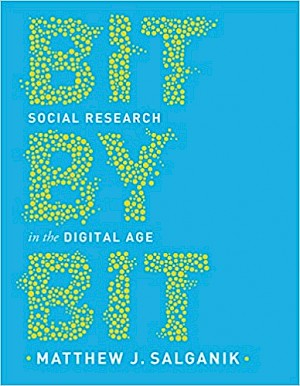23 July 2020
Bit by Bit
Social Research in the Digital Age
Matthew Salganik
2018, Princeton University Press, 422 pages,
ISBN 9780691158648
Reviewer: Ian Bright

This is an easy review. Buy this book. No matter your competence in data analysis, your experience in running experiments, or your ability to understand research papers, you will find nuggets of information that will be useful for your development as an economist – professional or not.
Matthew Salganik is Professor of Sociology at Princeton University. He is affiliated with several of Princeton’s interdisciplinary research centres including the Center for Information Technology Policy and the Center for Statistics and Machine Learning. He has worked in academia, government at the US Census Bureau, and the private sector at groups including Microsoft Research and The New York Times.
Salganik outlines how today’s far-reaching digital and data revolution can be used for research and greater understanding of society.
The book can be used several ways. It can provide an overview of how to run and understand experiments that use digital techniques. It could serve as a textbook for a course on digital experimentation – indeed the book emerged from a graduate seminar on computational social science taught by Prof Salganik at Princeton in the Department of Sociology since 2007. However, in my view it will be a point of reference to which you will often end up going back after an initial read. A website www.bitbybitbook.com associated with the book gives extra information including teaching resources.
The book is an iceberg. It gets more detailed as you delve deeper into each chapter but you never lose your overall understanding of the topic being discussed. This is due to a clear writing style. A topic is broken into smaller parts and practical examples are then used to demonstrate the issues being discussed in more detail. After that, there is a mathematical section at the end of most chapters, a question set and suggested reading. You can dig as deeply as you wish.
Four research techniques common to many social sciences, not only economics, are described but in words that make these techniques more accessible. Let’s not talk about big data. Call it “observing behavior”. Surveys? Let’s try “asking questions”. Randomised control trials? “Running experiments” gets the message across more quickly. Crowd-sourcing? “Creating mass collaboration” is what you are trying to achieve.
Ethics is woven throughout the book and a separate chapter is devoted to this subject. The uncertainties associated with appropriate procedures in the age of digital research are not shunned. The trade-off between respecting privacy and the way in which too strict enforcement, such as during the 2014 Ebola outbreak in West Africa, can prevent ethical and important research is highlighted. The relevance of this to the Covid-19 pandemic cannot be ignored. A plea for a principles-based approach to ethics based on the Belmont and Menlo reports rather than a rules-based approach is made. Four principles should apply. First, respect for persons: treating people as autonomous and honouring their wishes.
Second, beneficence: striking the right balance between risk and benefits of a study. Third, justice: ensuring that the risks and benefits of a research are distributed fairly. Fourth, respect for law and public interest: this extends beneficence to all relevant stakeholders.
“This book is for social scientists who want to do more data science, data scientists who want to do more social science, and anyone interested in the hybrid of these two fields” writes Salganik in the preface. His objectives were to write a book that was helpful, future-oriented and optimistic. Objectives achieved!
